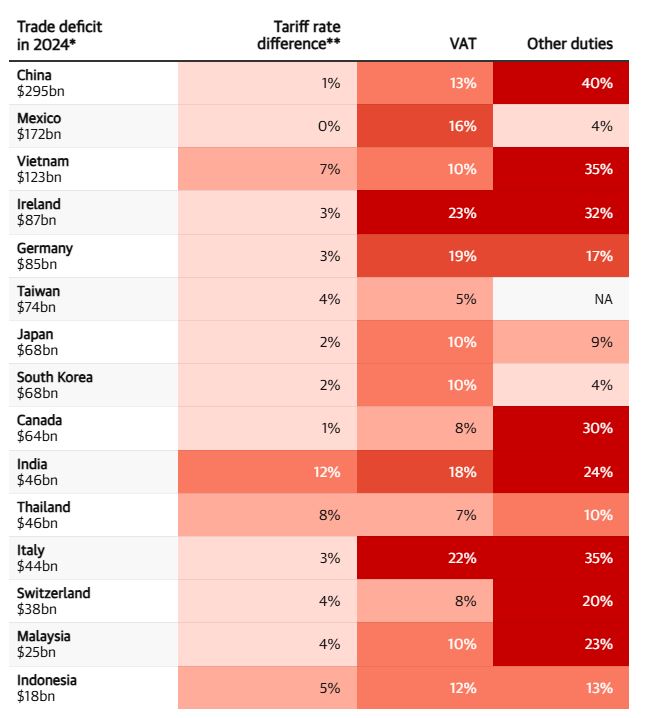Trump heralds a new round of duties by upsetting world economy

Donald Trump has said that « duties » are the most beautiful word in the dictionary.
The US president is expected to announce the last round of these taxes to US product imports on Wednesday night (Greek time). In what he calls « a day of liberation », Trump has argued that this step is necessary to raise money and encourage domestic production. However, it causes shocks in the world economy.
What are duties?
Duties are border taxes imposed on the import of goods from foreign countries. The importers pay them upon entering the customs service of the country or the block that imposes them.
Taxes are usually charged as a percentage of the value of a product. For example, a 10% duty on a product worth 100 euros involves a € 10 charge at the point where it is imported into the country.
In addition to the finished products, duties are also imposed on components and raw materials, significantly raising the cost for manufacturers, especially in a world with complex supply chains where the borders are often crossed. According to the Center for Strategic and International Studies, engines, gearboxes and other car accessories can cross the US-Canada and US-Mexico border up to seven or eight times.
Acting as an obstacle to trade, duties increase the price of an imported product for businesses and consumers. US bank JP Morgan estimated that 25% duties would raise new cars prices by $ 4,000 (3,683 euros).
They provide an incentive to buy a domestic equivalent product without duties where possible. Countries can also use non -duty barriers to trade, including import quotas, licenses, regulations, security standards and border controls.
Introducing duties from a country can often end up in a circle of retaliation or even a comprehensive trade war, such as the one expected between the US and China, but also the US – European Union. They are often used along with other policy tools as a means of negotiation between nations, affecting much more than their financial results.
What is Trump’s strategy?
The US is the largest importer of goods in the world – buying $ 3 billion worth of products in 2023. dollars.
Donald Trump has long been complaining that the deficit is reflecting « unfair » practices from US trade partners and considers it a sign of the US economy after decades of shifting factory production abroad.
Trump ‘unjust’ duties in American goods
The top 15 US trade partners based on commercial deficit:
According to the table above, China imports $ 295 billion fewer goods than the US than it exports to the US.
At the same time, it is obvious that from the European Union countries, only Germany and Italy have such large transactions and are a « headache » for US trade, always according to Donald Trump’s reasoning.
The US president is also considering the potential revenue that could result from federal budget duties, which would be important to compensate for his proposals on tax cuts.
However, both can not apply. To reliably increase revenue, a duty should be permanent and not used as a negotiating paper, the Guardian in his analysis.
Who could be the impact?
The additional costs of tariffs usually borne the end consumer, which means that Trump’s plans are likely to increase the cost of living in the US for American citizens. The great fear, however, is that this « brake » on the « wheels » of commerce will hit global economic growth and impress inflation.
Even before the imposition of new US duties, their threat has shaken the global financial markets and has affected business and consumer confidence. This has a huge impact on household spending and business investment.
Borrowing costs have increased abruptly for governments around the world. For nations with already high levels of debt following the succession of shocks by the 2008 financial crisis, this has increased the pressure to balance fiscal and has caused major political challenges.
The Organization for Economic Cooperation and Development (OECD) warned last month that, in a scenario in which the US and all their commercial partners are permanently increasing duties by 10 additional percentage points, world production could be reduced by about 0.3% by the third year after their import. At the same time, global inflation could increase by 0.4 percentage points per year per year in the first three years.
Blow to economic growth because of duties
Reduce GDP in the third year of forecast if the US and commercial partners increase duties by 10%.
According to the OECD, the scenario depicted in the above diagram assumes that both the US and its commercial partners increase the duties by 10% on imports.
So, it turns out in the eurozone countries, economic growth will be reduced by 0.17%if it is implemented.
They are not a new tactic of duties
It is worth saying, however, that trade barriers, taxes and duties have been a characteristic of the world economy for centuries, among other things, as a catalyst for wars and revolutions, such as the Second World War. Duties have been steadily abolished in recent decades, amid the rise of globalization.
Trump – who imposed duties during his first term – is not the first US president to shock the world in terms of commerce.
Most economists agree that the liberalization of trade has contributed to the exit of poverty more than one billion people worldwide, and has supported the standard of living in rich countries.
But there are tensions – from the weakening of manufacturing to environmental and social challenges, associated with complex, demanding resources and sometimes exploitative global supply chains.
Which countries could be most affected?
First of all, the US will suffer a « significant blow », with a decrease in production by 0.7%. Their largest commercial partners, Canada and Mexico, will also be significantly affected.
Washington has a particular complaint from what US Finance Minister Scott Besed called « dirty 15 » countries, representing about three -quarters of the US trade deficit.
The largest deficit in US trade with only one country is with China, worth $ 295 billion in 2024.
Trump also wants the duties to be « fair and reciprocal » to correct what he considers long -term imbalances in international trade and arise from non -duty barriers and taxes used by other countries. This includes value added taxes (VAT), especially in European states.
The US president considers VAT problematic because it is paid by customers of products manufactured in the US, while Washington does not have a similar federal tax levied on imports from abroad. However, many experts oppose that VAT is paid to both local products and imports.





:format(webp)/s3/static.nrc.nl/wp-content/uploads/2025/05/07140626/data131882325-46b0f8.jpg)



